‘Coming Out Simulator 2014’: A New Perspective on Coming Out

Have you ever wanted experience life as a farmer? There’s a simulator for that. Have you ever wanted to build a space ship? There’s a simulator for that. Have you ever had the urge to headbutt through someone’s house, into a gas station, and cause an explosion that will project you into orbit? Well friend, there’s a simulator for that too. Simulator games have always been a sweet spot in gaming, allowing players to experience tasks that rarely occur in their everyday lives.
Even in the vast sea of simulators, there is one thing these simulators have failed to recreate: human emotions. This is because simulators are not meant to connect with you on an emotional level. As a matter of fact, they are not connecting with you at all. In other games, you take control of a character in a different universe during a unique time in that world’s life. On the other hand, simulators place the gamer into the role of another person who could actually exist on an average day of their life. There are a few exceptions to this, like Goat and Rock Simulator, but for the most part all simulators follow this formula. This pattern between simulators is one of the main reasons they are also viewed as educational devices, as they give the depth of a life experience without having to deal with all the hardships associated with that task. It’s in this unique point of view that players gain an understanding of the real activity.
When you see a game with the word “simulator” before it, you expect a game that will allow you to see the world from that point of view. This encompasses everything from the trivial tasks to moments of hardship. As a result, we tend to learn from any simulator we play. But what happens when your simulator becomes personal? What if that simulator took one of the hardest moment of a person’s life and put us in their place? This is what “Coming Out Simulator 2014″ is all about. The creator, Nicky Case places the player in his place during the most difficult time of his life: coming out. “Coming out” s a figure of speech used anyone who is part of the lesbian, gay, bisexual, and transgendered (LGBT) community who has decided to announce their sexual orientation, gender identity and expression with another person. Coming Out Simulator 2014 is not just the story of a person coming to terms with their sexuality, but the challenges all people in a similar position face.
It’s Not That Easy…
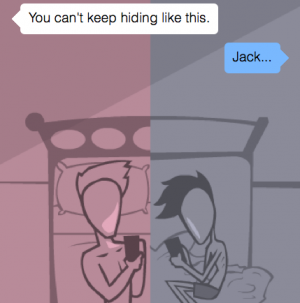
Coming out is a difficult process, one that involves a lot of consideration to one’s family and their own self-image. Throughout this scene, Nick is constantly referring to his parents and their culture. It doesn’t take much to realize how much pressure this may have on a person. Family is the closest thing to a person in both proximity and identity. It also serves as a main pillar of financial and moral support. Because they may not act in a way that is predictable, someone coming out would have to feel ready to do so. Jack, our character’s boyfriend, is obviously comfortable with himself and his sexuality. Using some visual cues from his open body language to the warm color of his room in contrast to our character, Nick, who’s curled up in fetal position in a dark-colored room. As the scene progresses, it’s now clear to why Jack is so relaxed; he already came out to his parents, and his coming out was well received. On the other hand, Nick has yet to reach the same level of comfort as Jack in terms of sexuality. There have been many studies that show that an accepting parental environment positively affects how well an LGBT person is able to adjust to the changes in their lifestyle and accept his or her newly pronounced identity (Beaty, 1999) . Our character has made it known that his parents wouldn’t ready for this knowledge of his sexuality, especially because of their homophobic ideology. In this case, their rejection scares him and has a negative impact on his identity. This creates feelings of uncertainty and worry for the player.
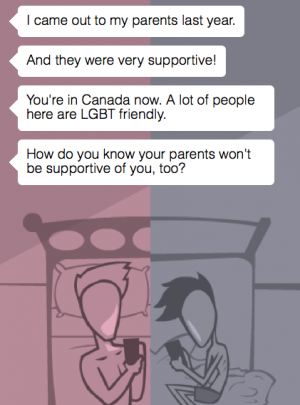
In addition to this, as Jack begins to press the player to “come out” a lot of small things begin to happen in the conversation. Jack becomes more assertive, pushing the player to the edge of his comfort zone, and pressuring him “out of the closet” so to speak. The dialogue options for the player become evasive, showing us that we aren’t ready for this. It’s not as easy for everyone as Jack is making it seem. Even so, the pressure coming from Jack is intimidating to the point where you can almost feel the pressure to make Jack happy. As the conversation continues, the choices seem to become harder to click as the three choices that you are originally given seem to merge into one choice: you’re not ready. By the time the scene comes to a rocky end, you’re no longer sure about how the rest of the night might turn out.
…Especially With Cultural Intolerance
They say “you can’t teach an old dog new tricks.” In “The Apology” by Plato, Socrates defends against accusations made by the Greeks. These claims against him took the form of two different enemies: The old accusers and the new ones. The old accusers were not a real enemy. As a matter of fact, Socrates compares to his defense against them to a fight with shadows. This is because the old accusers were the ones that preached and raised children on beliefs that may have been wrong. Children, in their nature, need the previous generation to aid them throughout their development. In doing so, they teach them values and knowledge that become rooted deep in their minds as they continue to develop. Not only that, but the world around children will also effect how they develop. Once you have an established belief, it is hard to remove these roots.
Throughout the conversation between Nick and his mother, she continuously groups “gays” as a look or a way of handling themselves. She even goes as far as dehumanizing gays by when she says “A gay.” This is her method of separating homosexuals from the rest of the world, by labeling them as abnormal. As the dialogue progresses, it’s revealed that she has read the text messages between the player and Jack send to each other.
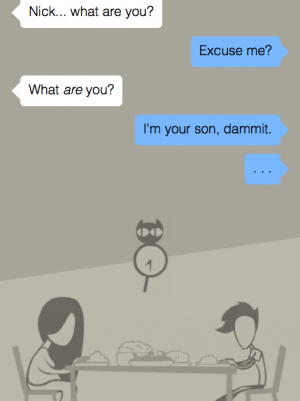
Now that she has made some connections, she tries to isolate her son from this Jack by saying that he will try to “recruit” Nick into becoming homosexual. These beliefs are not factual, but correct with respect to her cultural upbringing and biased views. She then psychoanalyzes her son, trying to make connections and rationalize whats wrong with him. In one scenario, the player has the choice of selecting a dialogue option where Nick says he is “bi”. This is a concept that the mother does not understand as her reply leads back to her original belief system, that you are either “one way or another”. Even when she tries to identify Nick’s position in the sexual relationship between him and Jack, she tries relating back to her standard which only recognizes sexuality between a man and woman. The mother is one of the many cases where a parent lack of proper sexual education due to cultural intolerance hinders a child’s sexual development.
In many cultures, we see some forms of intolerance to the LGBT lifestyle. One of the main causes of intolerance is strong religious beliefs. This is not to say that all people with strong religious beliefs are intolerant, but many people refer back to passages in their respective religions to combat “abnormal” sexual beliefs. In one study that researched homophobia through dialogue, a woman said her priest “insisted that it was abnormal, sinful and wrong”(Wong, 2013). In addition to this, many people brought up only recognizing human sexuality as the relationship between a man and woman than realizing there are other ways to perceive it (Richardson 1996). In one case, a mother recollecting her daughter’s coming out experience was numbing as she “did not know anything about sexual orientation” and “did not have anyone to talk to” (Wong, 2013). This is problematic for multiple reasons, one being that the mother in a parent-child relationship is often identified as the sympathetic one and is usually the most understanding in the process of coming out, especially in the case of men (Carnelley, 2011).
…And Dad’s Masculinity and Pride
Well, that didn’t go great. Even if mom outed us and threw up all over her food, at least she knows. So what is this lingering, uneasy feeling that we still feel after speaking with mom? Probably the oncoming conversation with Dad.
In the father-child relationship between a dad and a daughter is a very protective one. This is because fathers see girls as “more vulnerable.” On top of this, fathers associate their daughters as “complex”, “baffling” or “harder to understand”. However, when the relationship includes a son, it becomes reflective. In other words, the father can see himself in the child (Doucet, 2004). This creates a breeding ground for the father’s masculinity since he must teach the son how to be.
During Nick’s conversation with his father, it’s clear that he is very strict with his son. This conversation glances over topic like women, his academic well-being, and “being a man.” There are multiple times where he asserts his dominance by telling his wife to shut up or by disregarding her in some way. The air of masculinity would create a volatile environment for anyone, especially his son who is coming out. If you do choose to come out to Nick’s father, he becomes even more fierce. He threatens to remove Nick from school, impose checks on his phone messages and e-mails regularly, and even pay his tutor to possibly provide flirt or date him to show Nick that hes is straight. When the player is given the opportunity to respond to the father, there’s a chance the last thing they’ll see is a fist straight towards Nick’s face. This is how Nick’s father tries to instil masculinity into his son while forcing “the gay” out.
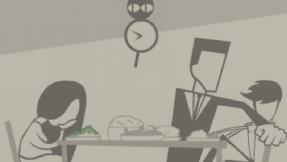
Masculinity is identified by four core themes: “No Sissy Stuff”, “Big Wheel”, “Sturdy Oak”, and “Give ’em Hell” (Brannon, 1976). Though these themes seem to be an old method of teaching, they still stand true today. “No Sissy Stuff” represents a man’s need to avoid participating in feminine activities. This applies to when a boy calls his dolls “action figures” or when he’s told that boys don’t cry. “Big Wheel” refers to a man’s need to gain the respect and approval of others. “Sturdy Oak” attributes to toughness. This ties in a bit with “No Sissy Stuff” as being a tough man requires numbing your emotions. “Give ’em Hell” is what’s used to describe a man’s willingness to fight or engage in violence. (Thompson, 1986). Fathers will instil these lessons into their children through discipline by enforcing punishments and in some cases physical violence. This is because a man will attribute conventional masculinity to a males as the norm, and because it’s important for his son to conform and continue a family his father could be proud of. In the case of Nick’s father, he is afraid and ashamed that he has lost his son to homosexuality when the truth is he lost his son to his own pride.
But At the End of the Day…
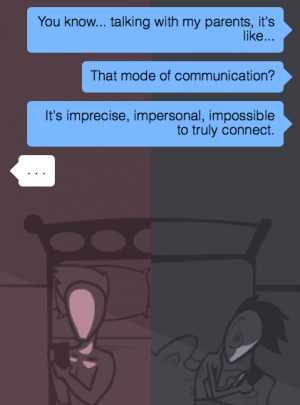
Your mother is crying, your father’s enraged, and you’re most likely going to lose your boyfriend, but at least dad ate mom’s puke. It can’t get any worse. Nick has just been through what many LGBT young adults would call a bad day. Rejection on any level is a hard thing to cope with. You’ve just completed the hardest part of Coming Out Simulator 2014. Feels good, right? Not a chance. The last scene with Jack and Nick ends on a bland note and sorrowful as you find out Jack left you three days later. That’s okay though; it wasn’t going to work out anyway. Once again, Nick brings us back to the present, breaks down the fourth wall and starts telling us what happened to him after coming out, but that’s for you to find out.
A simulator is a machine used to recreate certain environmental and other conditions for purposes of training or experimentation. This game may in fact be considered a visual novel of sorts, however it acts with the purpose of a simulator. After completing the game, the player has a view of what it’s like pushing open the heavy door on the way to gender and sexual identification, but we only get a small taste of the world that people live in today. The world is cold, full of intolerance, and is a horrifying place for people who do not fit into a suffocating cultural norm. LGBT individuals are the targets of large amounts of hate crimes and violence, sometimes even more after they have clearly identified themselves. But there’s one thing that they have that will always bring them back: pride. Pride is the one thing that you cannot take from an individual who is comfortable with who they are. On the other side of that door, there is a light. Coming Out Simulator 2014 clearly shows a few of the problems faced by many who are prepared to come to terms with their sexuality and gender expression, as well as what families do that contribute to this hardship. It also showed that at the end of the day, it does get better.
I’d like to end this with a quote from the game itself:
“At the end of this long, stupid, painful game where I played against people who should have been on my side, I won…I won.”
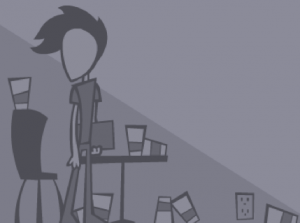
You can experience the simulation here.
Works Cited
Wong, J., & Poon, M. (2013). Challenging homophobia and heterosexism through storytelling and critical dialogue among Hong Kong Chinese immigrant parents in Toronto. Culture, Health & Sexuality, 15(1), 15-28.
Richardson, D. 1996. “Heterosexuality and Social Theory”. In Theorizing Heterosexuality , edited by D. Richardson, 1–20. Buckingham, UK: Open University Press.
Carnelley, K. B., Hepper, E. G., Hicks, C., & Turner, W. (2011). Perceived parental reactions to coming out, attachment, and romantic relationship views. Attachment & Human Development, 13(3), 217-236.
Doucet, A. (2004). ” It’s Almost Like I Have a Job, but I Don’t Get Paid”: Fathers at Home Reconfiguring Work, Care, and Masculinity. Fathering: A Journal of Theory, Research, and Practice about Men as Fathers, 2(3), 277-303.
Brannon, R. (1976). The male sex role: Our culture’s blueprint for manhood, what it’s done for us lately. In D. David, & R. Brannon (Eds.), The forty-nine percent majority: The male sex role (pp. 1–48)
Thompson, E. H., & Pleck, J. H. (1986). The struc- ture of male role norms. American Behavioral Scientist, 29, 531–543
Beaty, L. A. (1999). Identity Development of the Homosexual Youth and Parental and Familial Influences on the Coming Out Process. Adolescence, 34(135), 597-601.
What do you think? Leave a comment.











I absolutely agree with this. Especially the one where everyone’s parents are different. Some are not accepting of the LBGT community whereas other parents are 100% supportive. My parents are hard to communicate and are strong religious people so if I were to come out as a lesbian, they would disown me immediately instead of giving me a chance to explain why. Even if I were to have a girlfriend and tell her about how my parents would react, I know she would give those “…” treatment like how Jack was doing. She would think that I’m not really trying and letting my own paranoia take over my mind, so I can definitely relate a lot to Nick.
Thanks!
When doing the research for this article, I was really surprised reading the material. What it all boils down to is how the previous generations were raised. Today, sexuality is a beautiful painting with many colors and shades whereas back then it was just a grayscale painting. We have progressed to a point where we now can understand the many facets of sexuality and are raised with this in mind whereas older generations do not have an understanding of the depth sexuality now has.
This one was extremely… relatable for me, for the lack of a better word. I am in a similar position (straight down to the ethnicity, haha). I mostly played it safe with my options, so I’m terrified to see what the others “endings” are.
I really dislike the father.
Me too.
Wow. This game hit close to home I tell you. I am in a similar situation to the protagonist. This is a very accurate, very beautiful, and very important game.
The rage, the helplessness, and the loneliness the protagonist feels are all emotions I’ve felt, and it’s reassuring to see those feelings in a story like this.
This is a beautiful game.
I will never forget this game, and I will probably never play it again. One of those things.
This is really amazing!
Surprisingly well written little game.
Lovely article. More people should play the game, it is incredible and quite an experience. Keep it up!
This is actually a very well made, even the subject aside, “art piece” game. It’s got enough of self-humbling humour to make the dramatic parts feel cheesy but still touching, and it tells a well thought-through, satisfying (structure-wise), story.
I quite enjoyed it. While not gay or bi myself, I still found the situation and the main character relatable enough, having grown up in a very conservative religious Eastern European family.
I am straight as well, but I could still relate a few aspects of this game to my life as well, mostly the parents.
The endings were sublime.
Yeah, that part of the game was great! I found some humor in all of them, but what I really enjoyed most was how they all represented one general message that Nick wanted to make; that they were all better than what he had before coming out.
The messages are kinda fast for me… It would be better if I could scroll trough the dialogue.
Mo, this is very interesting information for me. I have heard of flight and drive simulators and understood their functionality. I have an abstract notion of “Sims;” where people create their own world. However, I see this type of gaming as an educational tool and a beneficial model to construct scenarios and measure theoretical outcomes. While you speak of the computer as not having the ability to demonstrate human emotions, I do see the computer as an instrument to solicit empathy from humans. Thanks for this article.
Thank you!
The one thing I said about emotions strictly dealt with simulators. As you said, simulators are educational tools that deal with more theoretical outcomes and real-life situations. I do not think that simulators were made to “tug at the heartstrings” so to speak. In a previous article I wrote about indie games, I explain my position on video games as art. This is because of a video game’s connection with the player. I do believe that some games are able to break down the mechanical wall and, as you stated, solicit empathy from humans. One of my favorite games “To The Moon” is the best example of this. I don’t think I’ve had more water run down my face in a lifetime than I did while playing that game.
I can’t relate to the events in the game. So, it’s hard to relate to the game as well. Thus, I did not enjoy it as much as I would have hoped to.
Really interesting and informative article! I didn’t know anything really about simulators, but this intrigued me, and it’s shocking that they would make a game like this one. Well written article!
Both the game and this article serve as an accurate historical representation of where we are in terms of a shifting society, and I think its great. Views on sexuality are slowly changing and I believe, by the end of the decade, we will look back at times like these and laugh (or, maybe scorn) at people’s inability to accept homosexuality.
As for the article itself, I find it as a fine description of the game. It also worked well as an advertisement, for I had never heard of the game until reading this.
This is a very interesting way to connect with people who are struggling with coming out. Usually simulator games are all for jokes and entertainment, and it is a nice change of pace to see one with an actual meaning and an emotional connection. I hope everyone can experience this simulator and place themselves in another’s shoes, or even connect with the character.
I enjoyed this article. I found it to be well written and well cited. I have not yet playe dthe simulator, but look forward to doing to soon. Thank you.
Having not played the simulator and just reading the article, I wonder if it would have more value if there were more options for reactions from parents. As you note, some families are very accepting. I think it would benefit some teens considering coming out to see that things could go well and not just witness what could go wrong. That might encourage more people to come out instead of hide who they are.
This game leaves a little to be desired in my opinion. Firstly, it is inherently different for a girl coming out and there is no option for that when you begin the game. Secondly, I feel that the parents’ reactions were pretty stereotypical. I’m speaking from experience here and again I acknowledge that the reaction is different for girls, but the reaction that I got was far more devastated and less angry; far more baffled and not violent. Another thing I find fault with is the fact that the game ends so shortly and without much actual experience coming out. Coming out is a process that never ends and although the game must end, it surely could be more inclusive to the types of people you have to come out to besides your parents. Employers, friends, new people you meet all your life must be told. There are far ranging consequences of coming out and this game covers so little of them. All I’m asking is to throw in a failed interview because of announced sexual orientation; a friend who “doesn’t think we should hang out anymore because it might look weird”; or a coach kicking you off the team because of the “No Sissy Stuff” mentality. I love the idea of this simulator but if it doesn’t leave a really bad taste in your mouth, it’s not accomplishing a simulation of coming out.
This was an interesting article. I’ve seen simulators that are just silly, such as the Goat Simulator, but this one is a lot more emotionally connecting. I thought the parental reactions were very one-sided and left me feeling uneasy just from reading about it here. It’s unfortunate that coming out isn’t a casual and accepting thing for everyone like it is in some families.